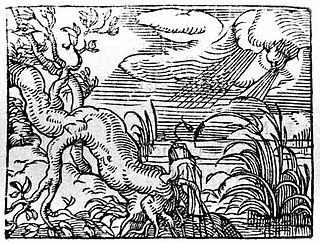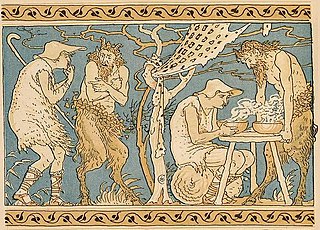
Aesop's Fables, or the Aesopica, is a collection of fables credited to Aesop, a slave and storyteller who lived in ancient Greece between 620 and 564 BCE. Of varied and unclear origins, the stories associated with his name have descended to modern times through a number of sources and continue to be reinterpreted in different verbal registers and in popular as well as artistic media.

The Boy Who Cried Wolf is one of Aesop's Fables, numbered 210 in the Perry Index. From it is derived the English idiom "to cry wolf", defined as "to give a false alarm" in Brewer's Dictionary of Phrase and Fable and glossed by the Oxford English Dictionary as meaning to make false claims, with the result that subsequent true claims are disbelieved.

The Fox and the Grapes is one of Aesop's Fables, numbered 15 in the Perry Index. The narration is concise and subsequent retellings have often been equally so. The story concerns a fox that tries to eat grapes from a vine but cannot reach them. Rather than admit defeat, he states they are undesirable. The expression "sour grapes" originated from this fable.

The Frog and the Ox appears among Aesop's Fables and is numbered 376 in the Perry Index. The story concerns a frog that tries to inflate itself to the size of an ox, but bursts in the attempt. It has usually been applied to socio-economic relations.
The story and metaphor of The Dog in the Manger derives from an old Greek fable which has been transmitted in several different versions. Interpreted variously over the centuries, the metaphor is now used to speak of one who spitefully prevents others from having something for which one has no use. Although the story was ascribed to Aesop's Fables in the 15th century, there is no ancient source that does so.

The Dog and Its Reflection is one of Aesop's Fables and is numbered 133 in the Perry Index. The Greek language original was retold in Latin and in this way was spread across Europe, teaching the lesson to be contented with what one has and not to relinquish substance for shadow. There also exist Indian variants of the story. The morals at the end of the fable have provided both English and French with proverbs and the story has been applied to a variety of social situations.

Zeus and the Tortoise appears among Aesop's Fables and explains how the tortoise got her shell. It is numbered 106 in the Perry Index. From it derives the proverbial sentiment that 'There's no place like home'.
The Ass in the Lion's Skin is one of Aesop's Fables, of which there are two distinct versions. There are also several Eastern variants, and the story's interpretation varies accordingly.

The Oak and the Reed is one of Aesop's Fables and is numbered 70 in the Perry Index. It appears in many versions: in some it is with many reeds that the oak converses and in a late rewritten version it disputes with a willow.

The Walnut Tree is one of Aesop's fables and numbered 250 in the Perry Index. It later served as a base for a misogynistic proverb, which encourages the violence against walnut trees, asses and women.
The Hawk and the Nightingale is one of the earliest fables recorded in Greek and there have been many variations on the story since Classical times. The original version is numbered 4 in the Perry Index and the later Aesop version, sometimes going under the title "The Hawk, the Nightingale and the Birdcatcher", is numbered 567. The stories began as a reflection on the arbitrary use of power and eventually shifted to being a lesson in the wise use of resources.

The Fox and the Lion is one of Aesop's Fables and represents a comedy of manners. It is number 10 in the Perry Index.
Washing the EthiopianWhite is one of Aesop's Fables and is numbered 393 in the Perry Index. The fable is only found in Greek sources and, applied to the impossibility of changing character, became proverbial at an early date. It was given greater currency in Europe during the Renaissance by being included in emblem books and then entered popular culture. There it was often used to reinforce outright racist attitudes.

The Satyr and the Traveller is one of Aesop's Fables and is numbered 35 in the Perry Index. The popular idiom 'to blow hot and cold' is associated with it and the fable is read as a warning against duplicity.
The Fox and the Woodman is a cautionary story against hypocrisy included among Aesop's Fables and is numbered 22 in the Perry Index. Although the same basic plot recurs, different versions have included a variety of participants.

The Ass and his Masters is a fable that has also gone by the alternative titles The ass and the gardener and Jupiter and the ass. Included among Aesop's Fables, it is numbered 179 in the Perry Index.

The Frog and the Mouse is one of Aesop's Fables and exists in several versions. It is numbered 384 in the Perry Index. There are also Eastern versions of uncertain origin which are classified as Aarne-Thompson type 278, concerning unnatural relationships. The stories make the point that the treacherous are destroyed by their own actions.

Hercules and the Wagoner or Hercules and the Carter is a fable credited to Aesop. It is associated with the proverb "God helps those who help themselves", variations on which are found in other ancient Greek authors.

"The Lion Grown Old" is counted among Aesop's Fables and is numbered 481 in the Perry Index. It is used in illustration of the insults given those who have fallen from power and has a similar moral to the fable of The dogs and the lion's skin. Parallel proverbs of similar meaning were later associated with it.

The Oxen and the Creaking Cart is a situational fable ascribed to Aesop and is numbered 45 in the Perry Index. Originally directed against complainers, it was later linked with the proverb 'the worst wheel always creaks most' and aimed emblematically at babblers of all sorts.















